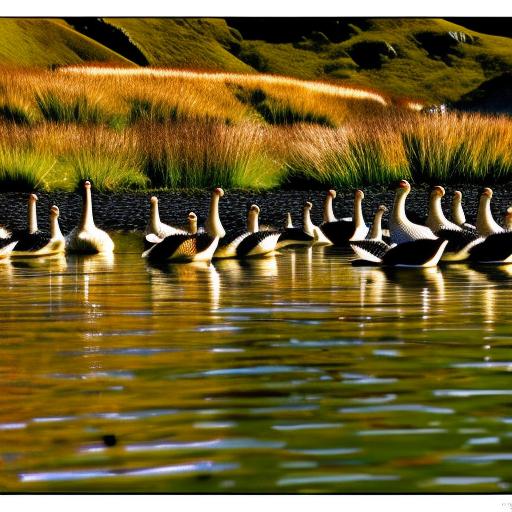Geese are a popular livestock animal in New Zealand due to their versatility and hardiness. They can be raised for meat, eggs, or as pets. Geese are also great for pest control and can help keep your property free of unwanted insects and weeds. Whether you are a farmer looking to diversify your livestock or a homesteader wanting to add some feathered friends to your property, keeping geese can be a rewarding and profitable venture.
Key Takeaways
- Keeping geese in New Zealand can be a rewarding experience for farmers and pet owners alike.
- Choosing the right breed of geese is important for success in raising them in New Zealand.
- Proper housing and fencing are necessary to keep geese safe and healthy in New Zealand.
- Feeding geese a balanced diet is crucial for their health and productivity in New Zealand.
- Health and disease management is important to prevent and treat illnesses in geese in New Zealand.
Choosing the right breed of geese for your New Zealand farm
When it comes to choosing the right breed of geese for your New Zealand farm, there are several factors to consider. Some popular breeds in New Zealand include the Toulouse, Embden, and Chinese geese. Each breed has its own unique characteristics, so it’s important to choose one that suits your specific needs.
Consider factors such as temperament, size, and egg-laying ability when choosing a breed. Toulouse geese, for example, are known for their calm and friendly nature, while Embden geese are larger and known for their meat production. Chinese geese are smaller in size but are excellent egg layers. Think about what you want to get out of keeping geese and choose a breed that aligns with your goals.
Housing and fencing requirements for geese in New Zealand
Geese require a secure and spacious area to live in, with access to water for swimming and drinking. They should have enough space to roam around freely and graze on grass. Fencing should be sturdy and at least 1.5 meters high to prevent escape. Geese are strong birds and can easily fly over low fences if not properly contained.
In addition to fencing, geese also need protection from predators such as foxes and dogs. Consider using electric fencing or predator-proof netting to keep your geese safe. Provide them with a shelter or coop where they can rest and seek shelter from the elements. Make sure the shelter is well-ventilated and provides enough space for all your geese.
Feeding and nutrition for geese in New Zealand: What to feed and how much
Geese require a balanced diet of grains, greens, and protein. They should have access to fresh water at all times. Feed should be provided in appropriate amounts to prevent overfeeding and obesity. Geese are grazers by nature, so they will enjoy grazing on grass and foraging for insects and weeds.
In terms of grains, you can feed your geese a mix of corn, wheat, barley, and oats. Greens such as lettuce, spinach, and kale can be offered as well. Protein can be provided through sources such as soybean meal or fish meal. It’s important to provide a varied diet to ensure your geese are getting all the nutrients they need.
Health and disease management for geese in New Zealand
Geese are generally hardy animals, but they can be susceptible to certain diseases such as avian influenza and botulism. Regular health checks and vaccinations can help prevent illness. It’s important to work with a veterinarian who is knowledgeable about geese to ensure their health needs are met.
Proper sanitation and hygiene practices are also important for maintaining good health. Keep their living area clean and free of droppings, as this can attract flies and other pests. Provide clean water daily and regularly clean their food dishes. Keep an eye out for any signs of illness or distress, such as loss of appetite or changes in behavior.
Breeding and hatching geese in New Zealand: Tips and tricks

Geese can be bred naturally or through artificial insemination. If you choose to breed naturally, make sure you have a ratio of one gander to three or four geese to ensure successful breeding. Geese typically lay their eggs in the spring, so be prepared for an increase in egg production during this time.
Incubation takes around 28-30 days and requires a warm and humid environment. You can use an incubator or let the geese sit on the eggs themselves. If using an incubator, make sure to follow the manufacturer’s instructions for temperature and humidity levels. Once the goslings hatch, they will need special care and attention in their first few weeks of life.
Raising geese for meat or eggs in New Zealand: Pros and cons
Geese can be raised for meat or eggs, with both options having their own benefits and challenges. Meat production can be profitable, but it requires a larger investment in terms of time and resources. Geese take longer to reach maturity compared to other poultry, so you will need to be patient. However, the meat is flavorful and sought after by many consumers.
Egg production is less labor-intensive, but it may not be as profitable as meat production. Geese are not prolific layers like chickens, so you may not get as many eggs as you would with other poultry. However, goose eggs are larger and have a richer flavor than chicken eggs, making them a popular choice among some consumers.
Geese as pets in New Zealand: What you need to know
Geese can make great pets, but they require a lot of space and attention. They can be trained to be friendly and affectionate, but they may also be noisy and messy. Geese are social animals and thrive when they have companionship, so consider getting more than one if you plan on keeping them as pets.
It’s important to provide your pet geese with plenty of space to roam around and graze. They will also need access to water for swimming and drinking. Geese can be trained to come when called and can even be taught simple tricks. However, keep in mind that they are still wild animals and may not always behave as expected.
Selling and marketing geese in New Zealand: Opportunities and challenges
There is a growing demand for locally-raised, high-quality geese in New Zealand. Marketing and selling geese can be challenging, but there are opportunities to sell to restaurants, farmers markets, and directly to consumers. Consider the legal requirements for selling geese and their products in New Zealand, such as obtaining the necessary permits and licenses.
It’s important to market your geese as a premium product, highlighting their unique qualities and benefits. Emphasize the fact that they are raised locally and are of high quality. Consider partnering with other local farmers or businesses to increase your reach and visibility.
The benefits and joys of keeping geese in New Zealand
Keeping geese can be a rewarding and profitable venture in New Zealand. Geese are hardy, versatile animals that can provide meat, eggs, or companionship. With proper care and management, geese can be a valuable addition to any farm or homestead. Whether you choose to raise them for meat, eggs, or as pets, geese can bring joy and fulfillment to your life. So why not consider adding some geese to your flock today?
If you’re interested in keeping geese in New Zealand, you might also want to check out this informative article on the best kind of coop for chickens. A well-designed coop is essential for the health and safety of your poultry, whether it’s chickens, ducks, turkeys, or geese. To learn more about creating a comfortable and secure living space for your feathered friends, click here: https://poultrywizard.com/keeping-chickens/what-kind-of-coop-is-best-for-chickens/.
FAQs
What are the regulations for keeping geese in New Zealand?
In New Zealand, there are no specific regulations for keeping geese. However, owners must ensure that their geese are not causing any harm or nuisance to the environment or other animals.
What kind of housing do geese need?
Geese require a sheltered area to protect them from the elements and predators. A simple shed or coop with a fenced outdoor area is sufficient. The shelter should be kept clean and dry.
What do geese eat?
Geese are herbivores and primarily eat grass, weeds, and other vegetation. They also enjoy grains and seeds as treats. It is important to provide them with a balanced diet that meets their nutritional needs.
How do I care for geese?
Geese require fresh water, food, and shelter. They also need regular grooming to keep their feathers clean and healthy. Owners should also monitor their geese for any signs of illness or injury and seek veterinary care if necessary.
Can geese be kept with other animals?
Geese can be kept with other animals, but it is important to introduce them slowly and monitor their interactions. Geese may become aggressive towards other animals if they feel threatened or territorial.
Do geese make good pets?
Geese can make good pets for those who have the space and time to care for them properly. They are social animals and enjoy interacting with their owners. However, they can be noisy and messy, so it is important to consider these factors before getting geese as pets.
Meet Walter, the feathered-friend fanatic of Florida! Nestled in the sunshine state, Walter struts through life with his feathered companions, clucking his way to happiness. With a coop that’s fancier than a five-star hotel, he’s the Don Juan of the chicken world. When he’s not teaching his hens to do the cha-cha, you’ll find him in a heated debate with his prized rooster, Sir Clucks-a-Lot. Walter’s poultry passion is no yolk; he’s the sunny-side-up guy you never knew you needed in your flock of friends!







